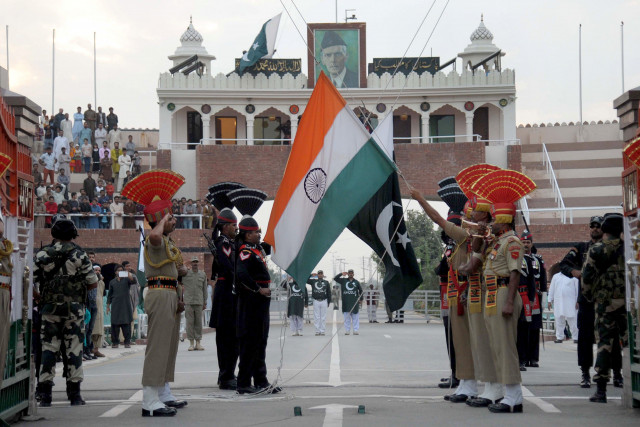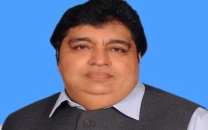Pakistan guns for peace amid Indian tirade
Envoys ask govt to stick to ‘peaceful neighbourhood’ stance despite provocations.

PHOTO: AFP
While the civil and military leadership have reacted sharply to the tirade from across the border, more than a dozen Pakistani ambassadors serving in different countries have cautioned the ruling party’s politicians not to fall into the “trap” laid by the administration of Indian Prime Minister Narendra Modi.
The ambassadors posted in Saarc (South Asian Association for Regional Cooperation) and ECO (Economic Cooperation Organisation) regions met last week at the Foreign Office to review a host of regional issues, including the current stalemate in Pakistan-India ties.
After three days of closed-door deliberations, the envoys presented their recommendations to the government.
A source familiar with the behind-the-scene consultations told The Express Tribune that while the envoys took strong exception to a series of controversial statements made by the Indian leadership, they cautioned the Pakistani government not to fall in the “trap” of the Narendra Modi-led administration.
The ambassadors, the official said, are of the view that New Delhi is increasingly uncomfortable about the recent agreement between Pakistan and China on the multibillion-dollar economic corridor. And in order to frustrate and undermine Pakistan’s plan, India was apparently resorting to such rhetoric.
In an unprecedented outburst against Pakistan, Indian PM Modi during his recent trip to Bangladesh had not only accused Islamabad of sponsoring terrorism, but also acknowledged the Indian government’s role in the break-up of Pakistan in 1971. His cabinet members were more vocal and suggested that India should support terrorists to neutralise terrorists. Some even threatened carrying out ‘surgical strikes’ against terrorists inside Pakistan.
On his recent visit to China also, the Indian premier had reportedly opposed the China-Pakistan Economic Corridor, fearing the project might be used in future for military purposes.
Despite the unending Indian diatribe, the envoys believed Pakistan must not get distracted by all this. “We need to stick with our plans and vision of regional connectivity and economic development, no matter what India says,” the official said, quoting the ambassadors. “It will only benefit India and serve its purpose if we get embroiled in the war of words,” he added.
The envoys also agreed that Pakistan should also develop a “counter narrative to pre-empt Indian propaganda” about maligning Islamabad with allegations of cross-border terrorism.
The recommendations were presented to Prime Minister Nawaz Sharif, who addressed the concluding session of the conference, where he said Pakistan would not abandon its quest for a “peaceful neighbourhood” and its overtures needed to be acknowledged and reciprocated by the other side.
Although the recommendations were not made public, Foreign Office spokesperson Qazi Khalilullah in his weekly briefing last Friday also said that Pakistan was committed to the Prime Minister’s vision of regional peace and wished enhancing bilateral relations with all neighbouring countries.
Published in The Express Tribune, June 15th, 2015.



















COMMENTS
Comments are moderated and generally will be posted if they are on-topic and not abusive.
For more information, please see our Comments FAQ